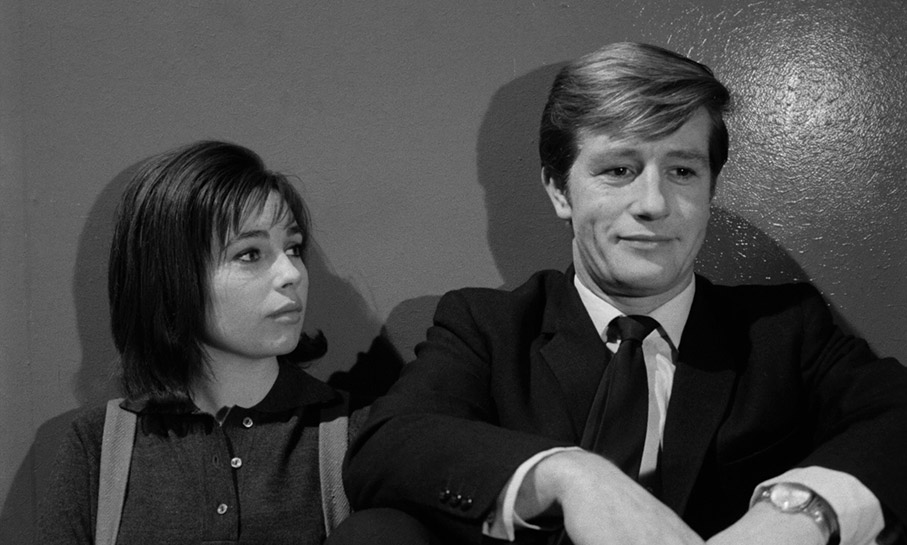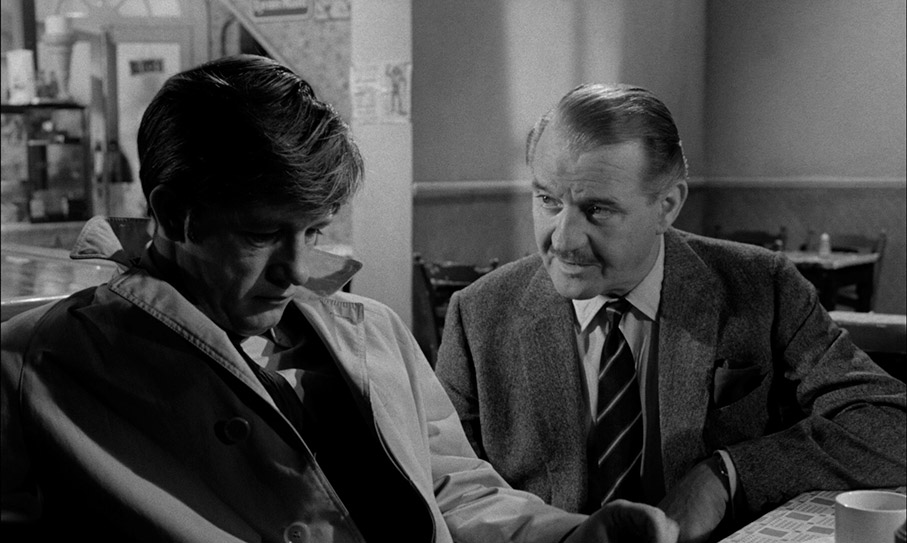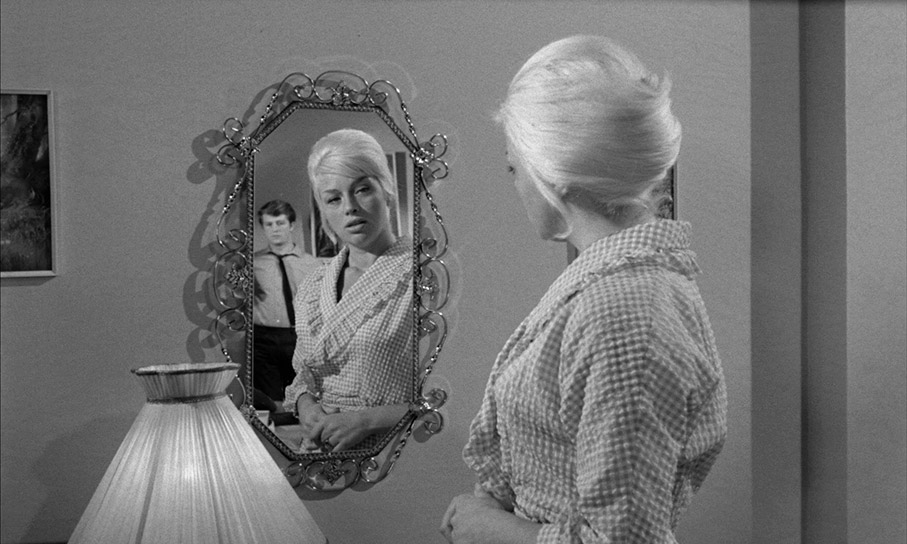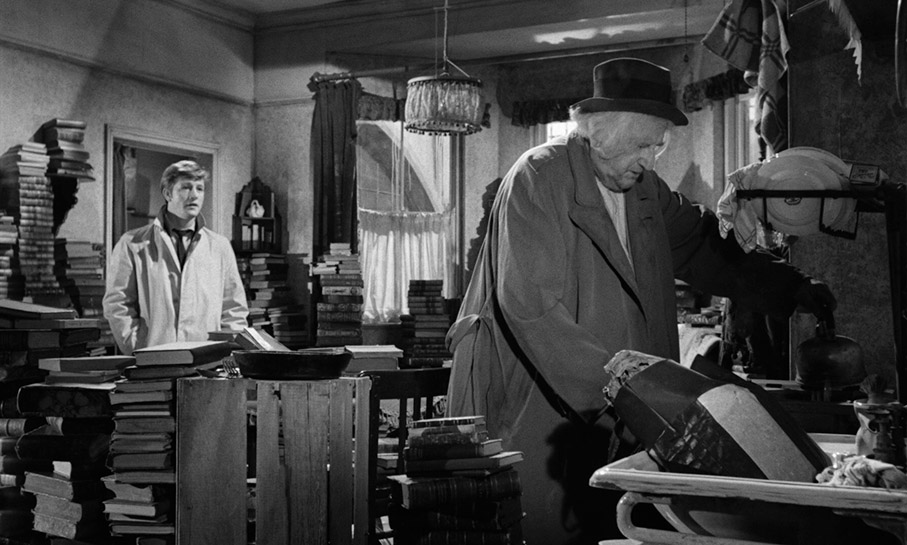|
Joe Beckett (Alfred Lynch) is a 20-something lad who lacks direction and any real sense of purpose. As the film begins, he’s getting dressed after spending the night with his on-off girlfriend, Isla (Kathleen Breck). As they converse, while Isla talks about her latest flirt, Joe idly gazes through the window and suggests that they should take a trip into the country and just walk, a trip he doesn’t at this point realise that he is destined to take later for a very different reason. “I hate walking,” Ilsa complains, then adding cheerily, “except to pubs.” “I’m going home,” Joe responds and heads towards the door, only to have Isla ask him to bring the milk in as he leaves, as some maniac keeps stealing it from the doorstep. It would seem that what constitutes maniacal behaviour was somewhat different in early 1960s London than it is today.
As the titles play out and Joe heads towards his Notting Hill Gate flat in the borough from which the film takes its title, he buys a few supplies in the local market and drops them off before heading despondently to his job at a small upmarket clothing store. As he approaches his workplace, we and he are made fully aware that he’s late for work by the sight of his officious boss, Mr. Royce (Alan McClelland), standing on the pavement looking accusingly at his wristwatch. This was also a favourite trick of the foreman of an engineering firm for which I once worked – full marks to one of my colleagues who once responded to this theatrically admonishing pose by throwing the foreman a smile and asking him cheerily, “New watch, Jim?”
Once inside the shop, Royce continues to admonish the weary Joe, and when the store does not stock the item that Joe’s first customer requires, the pompous Royce has a go at him again for not trying to sell the man an alternative item, prompting Joe to hand in his notice and the angry Royce to dismiss him on the spot. The argument between them is witnessed by a customer, who then spots Joe in the café next door and sits down at his table and starts chatting with him. In a neatly executed edit, the two men then transfer to a pub, where the man introduces himself as Captain Richard Dyce (Eric Portman), and as the two converse it becomes clear that Dyce is sizing Joe up for possible involvement in as-yet unspecified criminal activity.

Plot plays second fiddle to character and a sense of time and place in the first half of West 11, a relatively unsung entry in the British kitchen sink drama cycle of the late 50s and early 60s, one that kicked off with Tony Richardson’s 1959 adaptation of John Osborne’s celebrated play, Look Back in Anger, and that included such luminary works as Room at the Top (Jack Clayton, 1959), Saturday Night and Sunday Morning (Karel Reisz, 1960), A Taste of Honey (Tony Richardson, 1961) and A Kind of Loving (John Schlesinger, 1962). It’s indicative of the way West 11 seems to get sidelined that it’s not included on Wikipedia’s list of kitchen sink dramas and is instead classified by the site as a crime film. Yet West 11 was written by Keith Waterhouse and Willis Hall, the team responsible for the screenplays for John Schlesinger’s A Kind of Loving and Billy Liar (1963), which immediately preceded West 11 and are both included on the above-mentioned Wikipedia list. And yes, West 11 is technically a crime drama, but while that crime in question is planned and later acted upon, it’s not the film’s raison d’être and serves instead as a catalyst for Joe’s awakening as a functioning and emotionally responsive human being.
Certainly, the film lacks the sort of dynamic and charismatic central character that you find in other British social realist films of the period – think Richard Burton as Jimmy Porter in Look Back in Anger or Albert Finney as Arthur Seaton in Saturday Night and Sunday Morning. Indeed, as played by Alfred Lynch, Joe initially comes across as an emotionally inexpressive blank slate, a seemingly odd decision on the part of the actor and director but one whose purpose becomes clearer as the film progresses. Despite the conversations with Dyce that move the underlying plot forward in small but still significant hops, the film’s first half is primarily a focussed on Joe and the world in which he is almost indifferently part of, as he interacts with individuals who tell us as much about him as they do about themselves and whose backstories are probably worth a movie of their own. There’s the oddly named Silent (Harold Lang), an ever-smiling, glass-eyed and creepy individual who lusts after girls who wouldn’t touch him with a bargepole and appears to make a living out of shopping local crooks to the police. There’s Mr. Gash (Finlay Currie), an elderly neighbour that Joe keeps a watchful eye on, even stepping in to forcefully protect him when he is being pestered by two yobs. There’s Father Hogan (Patrick Wymark), whom Joe and his mother once knew well in his former parish and whom he pays a call on after being pushed to do so by his mother on an unexpected visit to town. It’s here that we discover that Joe is a lapsed Catholic, still reverential enough to briefly kneel and cross himself when entering a church but questioning Hogan on the logic of its teachings, which prompts the extraordinary response, “Why don’t you forget reason for a while? Try prayer instead.” Excuse me? Then there’s Georgia, wonderfully played by Diana Dors without a hint of vanity, a woman who is only too aware that her best years are behind her and who, in her own words, is “young enough to want another husband, too old to get the kind I want.” After things have hit a bad patch with Ilsa, Joe ends up at her place, where she cooks him a much-needed meal and asks him to talk to her about anything. “I’m lonely,” she admits in a disarmingly touching moment, which prompts Joe to lead her into the bedroom with an almost dutiful, “Come on, then.” Significantly, none of the more prominent secondary characters are written in just to texture Joe’s world, and all, Ilsa included, have a direct impact on how his story subsequently unfolds.

Disrupting this equilibrium, of course, is Dyce, a well-practiced conman who lives opportunistically day-by-day and takes advantage of almost everyone he meets. This is established early on when he jumps the queue and grabs another customer’s coffee in the café where he first talks to Joe, then again in the pub after when he snatches a matchbook belonging to a man who clearly doesn’t want the aggro of demanding it back. He sweet-talks Georgia into letting him stay at her flat, romancing her occasionally to continue living rent-free and then skipping off for days to who knows where. When he shares a taxi with her shortly after moving in, he skips from one confident deception to another with such greased ease that you almost have to admire him. His only regular associate is Jacko (Peter Reynolds), a nervously twitchy operative whom Dyce assigns to follow Joe and report back on his suitability for a job that marks the only point where credibility starts to become an issue. Having not read The Furnished Room by Laura Del-Rivo, the novel on which Waterhouse and Hall’s screenplay was based, I found myself struggling to believe that the Joe Beckett of the film would accept the job offered by Dyce (I’m not saying what it is to avoid dropping spoilers), for all his persuasive chat and subtle intimidation. I’m thus indebted to film historian Matthew Sweet, who has read the book and on this disc’s only substantial special feature discusses aspects of Joe’s personality that didn’t make the their way into this film adaptation and that provide a more convincing reason for why he is so easily recruited.
Some may be put off by the fact that West 11 was directed by Michael Winner, but this is Winner long before he hooked up with Charles Bronson and started making a tit of himself in commercials and on current affairs programmes. There’s no question that he was once a talented young director, one whose early work – at least on the evidence I’ve so far seen – gets unfairly overlooked when this period of British cinema is the topic of conversation. And he’s really on form here, taking a low-key observational approach to solid material with only a couple of (frankly very effective) editing and camerawork flourishes. He also convincingly captures the atmosphere and mores of time, from the jazz clubs and hip parties to the moralistic landladies and their strictly enforced boarding house rules regarding after-hours female visitors. There’s even an uncanny prediction of things to come dressed in the coat of the still active poison of racial hatred, when Joe passes an anti-immigration rally in which a crowd of unimpressed workers are being addressed by an obnoxious, Oswald Mosely-like figure. What’s particularly creepy about this sequence, aside from the fact that all such racists are inherently creepy, is that the name of his anti-immigration party is Britain First, an invention of the filmmakers (or perhaps the original author) that 48 years later would be adopted by the very sort of party that this speaker would likely have joined and campaigned for.
Winner also had an eye for emerging talent, something particularly evident in the small roles played by actors who would find wider fame in the years that followed. The rally speaker is played by Brian Wilde, who would later become a familiar face on TV in more benevolent roles in the likes of Porridge and Last of the Summer Wine, while one of the thugs who harasses Mr. Gash is played by a young David Hemmings. Anthony Valentine and Una Stubbs (“You squashed my nut!”) make brief appearances as party guests, and the first clothes shop customer is played by Gerald Sim, a TV and film regular most widely known today for his role as The Rector in To the Manor Born. According to the film’s IMDb page, future director Mike Leigh even makes an uncredited appearance, but what role he plays is teasingly unspecified.

West 11 is an offbeat but intriguing example of British social realist cinema, one whose directionless and emotionally vacant central character, while initially distancing, gradually evolves into a genuinely sympathetic figure whose fate I found myself increasingly invested in. While his willingness to take part in a crime that I’ve deliberately avoided discussing might seem a bit of a stretch – that the reasons supplied by the novel are sidestepped by the film is perhaps understandable given the year of its production – the job itself gives rise to a genuinely tense sequence that had me quietly begging Joe to see the light and back out before it was too late. I’m not going to claim that it’s a misunderstood masterpiece, particularly in the light of its ground-breaking contemporaries, but it is a damned good film that is ripe for rediscovery, and on the evidence of this and the following year’s The System, it would seem that Michael Winner’s finest work as a director, a tad ironically, may also be his most rarely discussed and seen.
The result of a new restoration whose details I unfortunately don’t have to hand, the 1.66:1 1080p transfer on StudioCanal’s Blu-ray is consistently impressive, showcasing the film’s almost expressionistically exterior dourness well without looking visually glum. The contrast is nicely balanced and the black levels solid, while the detail is crisply rendered without any obvious signs of digital enhancement, only softening in a handful of shots – the hoods harriasing Mr. Gash are a prime example – which may or may not be down to the oriiginal footage. The picture is also clean and stable in frame with no obvious traces of damage and displays a fine film grain.
The Linear PCM 2.0 mono track has some expected restrictions in the dynamic range, but is otherwise clear and free of damage.
Optional English subtitles for the deaf and hearing impaired have been included.
Unusually, playing the film first brings up the following textual warning: “Please note that this film reflects historical attitudes which audiences may find outdated or offensive.” That’s fair enough, but I have to say I watched plenty of other films from the period in recent years that contain more uncomfortably dated material than you’ll find here, none of which were as cautious about the viewer’s sensibilities.
Interview with Film Historian Matthew Sweet (21:30)
An enthusiastic Matthew Sweet makes a persuasive case for the qualities of what he clearly regards as an undervalued film that captures the atmosphere of London at that time. He examines the notion of Joe as an existentialist character of the sort you might find in a work by Godard, Truffaut or even Jean-Paul Sartre, as well as detailing aspects of Joe’s character that are more clearly defined in the novel than in the film. He compares Eric Portman’s cat-like portrayal of Dyce to other phoney-respectable middle-class characters of the era, heaps praise onto Diana Dors and her performance in the film, and reveals that Michael Winner wanted Julie Christie for the role of Ilsa but was overridden by studio execs, who regarded her then as “a B-movie actor,” He summarises by describing the film as cruel, sleazy and quite remarkable. I really appreciated this.

Theatrical Trailer (3:14)
Kicking off with an animation that turns the ‘11’ of ‘West 11’ in the ‘X’ of ‘X Certificate’, this is an otherwise workmanlike standard definition trailer whose buzz phrases are surprisingly faithful to the characters and the film and not the usual hyperbolic exaggerations, despite their dramatic delivery. It does, however, reveal the nature of the crime I have gone to some lengths to avoid discussing, so approach with caution.
West 11 is a film that it took me a while to really get into, but it still had me interested from the off and ultimately I enjoyed it a great deal. Well written and directed and peppered with intriguing characters and a fascinating spot-the-face supporting cast, it’s well worth a look for those with an interest in British social realist cinema of the early 60s. The transfer is solid and while there is only one special feature of note, it’s a good one, so this is still and easy one to recommend.
|